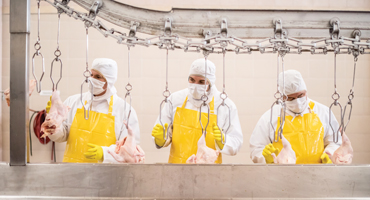Ensuring safe food for Canadians
May 13, 2019
Understanding the Safe Food for Canadians Regulations (SFCR) and how it impacts your business.
ENSURING the safety of the food Canadians eat every day has always been a commitment of the Canadian federal government and purveyors of food. However, a new set of standards—the Safe Food for Canadians Act and Regulations—were recently introduced to apply consistent requirements to all food in Canada that is imported or prepared for interprovincial trade or export, further protecting the safety and integrity of the food served on Canadian tables every day.
The Act and Regulations, Canada’s first comprehensive set of food safety regulations that apply to all food, came into force on January 15, 2019, and include a transition schedule for retailers to meet the requirements. The first wave of compliance dates was January 15, 2019 for those individuals who are producing food in the sectors that had already previously been regulated by the Canadian Food Inspection Agency (CFIA) under commodity-specific acts and regulations. The next wave will come into effect in 2020. And the final wave will be in 2021.
The SFCR are a glowing example of collaboration between the federal government and the food industry. And, as Tammy Switucha, Senior Director, Food safety Requirements at CFIA, points out, their process had to be thorough in order to capture and address all of the concerns within the sector.
“We began consulting with and talking to many businesses and operators within the food sector back in 2014,” she explains. “We undertook a variety of different ways to engage them, including meetings and targeted conversations with business owners of all sizes and offerings. We really covered the waterfront over a fouryear period to understand what the issues and concerns were.”
The CFIA also met with national associations, including Retail Council of Canada (RCC), to ensure all considerations with respect to the regulations were addressed.
“RCC was involved in all consultations with the CFIA,” states Jason McLinton, RCC’s Vice President, Grocery Division and Regulatory Affairs. “We wanted to make sure that, from retailers’ point-of-view, the regulations made sense and that there was flexibility built in to them in order for retailers across the country to realistically and efficiently comply with all requirements.”
Although the SFCR is centred on businesses that produce food for interprovincial trade, and import and export food out of Canada, it also applies to the retail sector through its provisions that pertain to traceability requirements. The Regulations also carry over all of the labelling and packaging requirements that had previously been in other regulations. So, businesses undertaking activities related to the packaging and labelling of food for the purpose of selling that food to consumers will be affected by the Regulations.
“A recall can be very expensive for retailers,” says McLinton. “By having stronger traceability requirements included in the Regulations reduces the time it will take retailers to identify and remove unsafe foods from the market, resulting in the protection of the safety of Canadian consumers, as well as cost savings for businesses.”
In addition, as Switucha points out, the Regulations also support Canadian businesses, helping them in their bid to maintain competitiveness on the world stage.
“The food industry is constantly changing,” says Switucha. “And risks with the development of food are also changing quite rapidly. We felt that the regulatory framework in Canada needed to be nimbler to meet these risks and reflective of the level of innovation that’s happening within the food supply chain. Canada’s trading partners are also moving to modernizing their regulations, so we felt that we needed to stay pace and support the ability of Canadian producers to export, because our ability to participate and be competitive in the world market is dependent on our domestic regulatory system.”
For retailers and other businesses trying to determine what next steps should be taken on their way to compliance, Switucha says that there are three main areas that retailers would be wise to focus on.
“Licensing is the first requirement. Any business that’s undertaking an activity outlined in the Regulations needs to be licensed. The second area is the requirement that is based on international standards for preventive controls and the need for preventive control plans. The third area is the traceability requirements,” she says, continuing, “We’ve spent a lot of time and effort in preparing a full suite of guidance material that’s available on our website in both official languages to help businesses understand what they need to do to prepare and comply.”
BY SEAN C. TARRY



